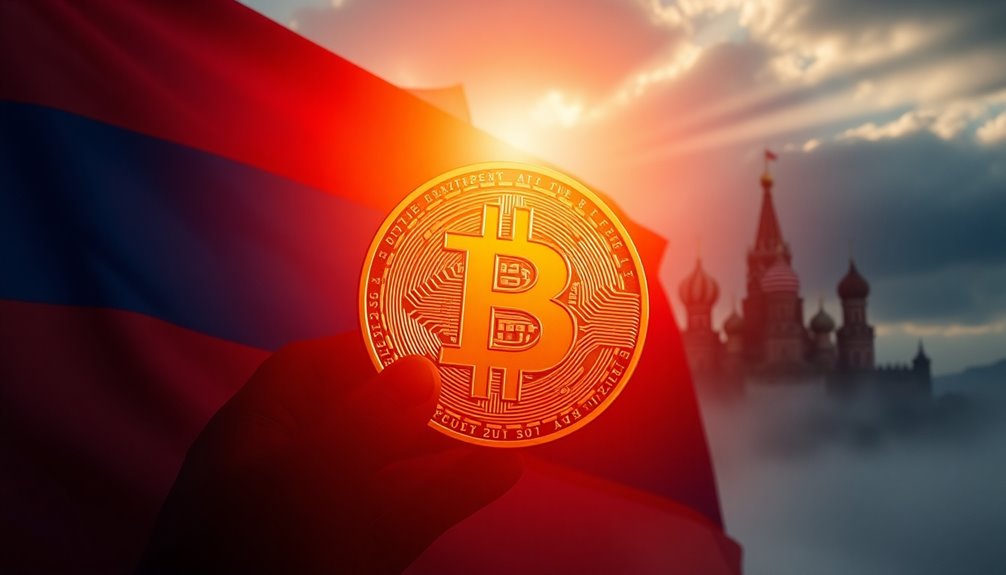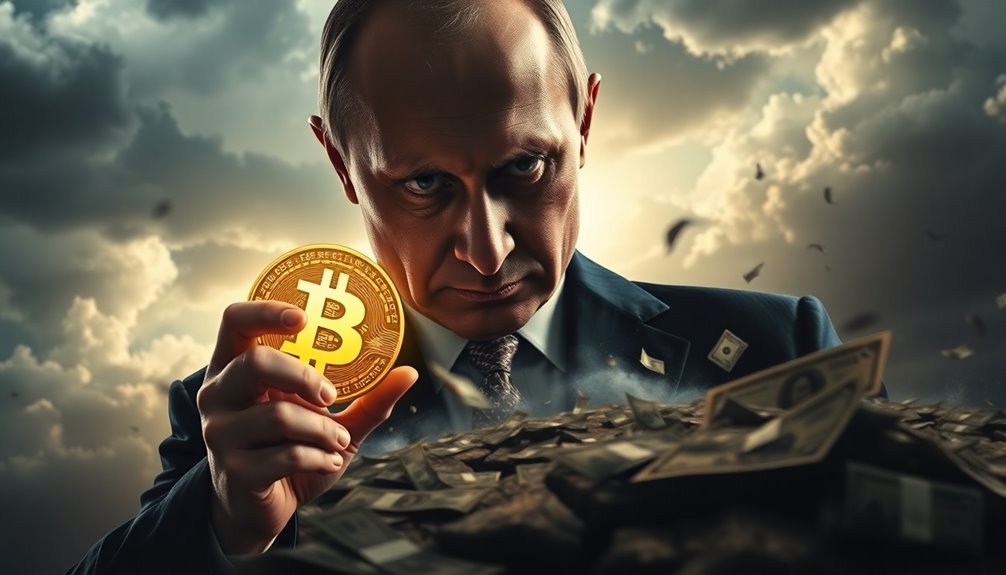Putin's recent declaration on Bitcoin is reshaping the financial landscape, presenting a challenge to the dollar's supremacy. By officially recognizing digital assets and legalizing crypto mining, Russia is setting the stage for a new economic paradigm. This shift enables international transactions in cryptocurrencies, circumventing existing sanctions and reducing dependence on the dollar. As more countries explore alternatives to fiat currencies, Putin's Bitcoin bomb can greatly impact global finance. If you're curious about how these developments might influence the international market and your financial future, there's a lot more to uncover about the changing dynamics. This development not only signals a strategic move for Russia but also accelerates the global shift toward decentralized financial systems. Putin’s Bitcoin stance impact could ripple across emerging markets, prompting them to reconsider their reliance on traditional monetary frameworks. As the dominance of the dollar faces mounting pressure, the adoption of cryptocurrency may redefine the balance of power in global finance.
Key Takeaways
- Putin's endorsement of Bitcoin and digital assets aims to weaken the US dollar's dominance in international finance.
- Russia's legalization of crypto mining and taxation provides a regulatory framework that enhances investor confidence in digital currencies.
- The country's shift towards cryptocurrency is a strategic response to extensive sanctions, highlighting a move towards de-dollarization.
- Increased cryptocurrency adoption among nations is a reaction against financial sanctions and a desire for equitable monetary systems.
- Blockchain technology's integration into finance is facilitating faster, cheaper transactions, further promoting digital currencies as alternatives to fiat.
Putin's Shift to Bitcoin

In a notable pivot, Putin's government has embraced Bitcoin and other digital assets, marking a new era for cryptocurrency in Russia. On November 29, a new law officially recognized digital assets as legal property, allowing cryptocurrency mining and its use for international payments.
This change comes alongside the approval of a crypto tax bill, treating Bitcoin and similar currencies as property. Starting November 1, mining became legal, regulated by the Central Bank of Russia (CBR), which also oversees the integration of cryptocurrencies into the financial system. Legalization of BTC and crypto mining occurred in August 2024, highlighting the government's commitment to the digital currency landscape.
Though using cryptocurrencies for domestic payments remains banned, around 14.6 million Russians—about 10% of the population—own digital currencies. With nearly $7 billion held on crypto exchanges, the country ranks high in global crypto adoption.
As banks introduce cross-border crypto payment services, the landscape is shifting rapidly.
Putin recognizes the inevitability of cryptocurrency, claiming its cost-effectiveness and reliability make it indispensable. As Russia seeks alternatives to the US dollar, discussions at the BRICS Summit hint at a blockchain-based payment system for international trade.
This strategic shift could redefine financial dynamics and influence global markets notably.
Economic Consequences of Sanctions

Sanctions impose severe economic consequences on target countries, often leading to significant declines in GDP and worsening conditions for the populace. When you consider the impact, GDP growth typically drops by 2 percentage points per year under UN sanctions and 1 percentage point under US sanctions. This translates to a staggering 25% decline in GDP per capita for those under UN sanctions and 13% for those facing US sanctions.
Trade and exports suffer immensely as well; extensive sanctions can slash exports by up to 78%. For instance, US sanctions in 1995 led to a reduction of exports by $15 billion to $19 billion across 26 target countries. Additionally, the cumulative loss of wage premiums in the export sector due to sanctions could exceed $20 billion over two decades.
The job market isn't spared either, with over 200,000 jobs lost in higher-wage export sectors.
Furthermore, sanctions drive poverty and inequality, increasing the poverty gap by roughly 28%. Access to essential public goods and services diminishes, exacerbating issues of malnourishment and starvation in affected countries.
Ultimately, sanctions rarely achieve their intended foreign policy goals and often bolster support for targeted governments, as seen in Russia.
Changes in Russian Cryptocurrency Regulation

Putin's Bitcoin Bomb: "Unstoppable!"—The Earth-Shaking Declaration That Could Cripple the Dollar
Changes in Russian Cryptocurrency Regulation
Recently, Russia has shifted its approach to cryptocurrency regulation in response to mounting pressures from Western sanctions. This new regulatory framework is designed to provide clarity and security for investors while ensuring compliance with international standards. Here's what you need to know:
- Regulatory Changes: The Central Bank proposed a ban on cryptocurrencies in early 2022, but now requires providers to have adequate capital and licenses, adhering to KYC and AML laws. This shift comes after the increased mining hash rate in Russia post-China's ban, highlighting the nation's growing interest in crypto.
- Tax Incentives: Crypto transactions are exempt from VAT, and profits are taxed at a capped 15%, similar to securities. This encourages usage within Russia.
- State Oversight: The Central Bank has consolidated control, leading to the establishment of state-backed exchanges and requiring miners to report activities to Rosfinmonitoring.
- Cross-Border Legislation: A new law permits the use of digital assets for international transactions, enabling Russian businesses to engage in crypto-based international trade.
These changes reflect Russia's strategy to leverage digital currencies, aiming to strengthen its economy and circumvent Western financial restrictions.
Technological Innovations in Finance

Technological innovations in finance are transforming how we manage money and conduct transactions, making processes faster, more secure, and accessible. At the heart of this evolution is blockchain technology, which offers a decentralized ledger that securely records transactions across a network. This transparency and immutability foster trust and make fraud nearly impossible. Furthermore, the adoption of cryptocurrencies as a medium of exchange is gaining traction, allowing individuals to conduct transactions without the need for traditional financial institutions.
You'll find that decentralized finance (DeFi) is revolutionizing financial services by eliminating the need for traditional banks. With smart contracts, transactions execute automatically when conditions are met, cutting out middlemen and reducing fees. This shift gives you access to advanced financial instruments like decentralized derivatives and algorithmic stablecoins.
Additionally, the integration of blockchain with AI and IoT enhances data reliability and security, paving the way for innovative applications in various sectors. Tokenization optimizes asset management, ensuring easier access and heightened security.
As you explore cross-border payments, you'll appreciate how blockchain minimizes risks while promoting efficiency and interoperability. With the emergence of Central Bank Digital Currencies (CBDCs), the financial landscape continues to evolve, offering new solutions that promise safety and liquidity in an increasingly digital world.
Global Impact on the Dollar

The endorsement of Bitcoin as a potential global reserve asset by Putin is shaking the foundations of the US dollar's dominance in international finance. This strategic move aims to reduce reliance on the dollar, especially in light of Western sanctions.
As BRICS countries ramp up their efforts for global economic growth, the implications for the dollar could be significant.
Here are four key impacts you should consider:
- De-dollarization Trends: Countries are increasingly seeking alternatives to the dollar, aligning with Russia's broader agenda.
- Increased Cryptocurrencies Usage: Cryptocurrencies are emerging as reliable payment methods for nations facing financial sanctions. In this context, crypto adoption is viewed as a means to navigate external financial pressures.
- Local Currency Transactions: BRICS is promoting the use of local currencies, further diminishing the dollar's influence.
- Geopolitical Stance: Putin's comments reflect a pushback against the dollar's role in political control, signaling a desire for a more equitable monetary system.
While the US dollar's dominance remains entrenched, these shifts could reshape international finance, paving the way for Bitcoin and other cryptocurrencies to play a central role in future transactions.
The landscape is changing, and it mightn't favor the dollar as it once did.
Frequently Asked Questions
How Does Bitcoin Mining Work in Russia?
Bitcoin mining in Russia involves using powerful computers to solve complex mathematical problems, which validate transactions on the Bitcoin network.
You'll need to register with the Ministry of Digital Development if you're a legal entity or entrepreneur. While small-scale miners can operate without registration, you must comply with energy consumption limits.
The government regulates where you can mine and imposes taxes on your earnings, treating them similarly to securities for tax purposes.
What Are the Risks of Using Cryptocurrencies in Russia?
Using cryptocurrencies in Russia presents a double-edged sword.
On one side, you've got innovation and potential economic freedom; on the other, regulatory pitfalls and security threats.
You'll face government scrutiny, as authorities impose strict laws and monitor transactions.
The volatility of crypto markets can jeopardize your finances, while cyberattacks lurk at every corner, risking your assets.
Weigh these risks carefully before diving into the crypto world in Russia.
Can Bitcoin Be Used for Everyday Purchases in Russia?
You can't currently use Bitcoin for everyday purchases in Russia.
Domestic transactions with cryptocurrencies are prohibited, meaning you can only trade or invest in them. While many exchanges allow you to buy Bitcoin with rubles, the legislation restricts its use for regular shopping.
However, for international payments, Bitcoin might become more viable as regulations shift.
Just remember to stay informed about compliance and security measures while maneuvering this evolving landscape.
How Does the Russian Public View Bitcoin Adoption?
As the saying goes, "Where there's smoke, there's fire."
The Russian public's view on Bitcoin adoption is increasingly positive, with 86% familiar with cryptocurrencies.
About 9% actively engage in crypto transactions, often to navigate economic sanctions.
With favorable regulations in place, many see Bitcoin as a viable alternative to traditional finance.
Growing awareness and use suggest that you might find Bitcoin playing a significant role in Russia's economic landscape soon.
What Is the Future of Bitcoin Regulation in Other Countries?
The future of Bitcoin regulation in other countries looks dynamic and varied.
You'll see many nations updating their frameworks to address both risks and opportunities associated with cryptocurrencies.
Regulatory shifts will likely focus on consumer protection, taxation, and anti-money laundering measures.
As more countries explore Central Bank Digital Currencies (CBDCs), you can expect a greater push for thorough regulations that balance innovation with safety, promoting wider acceptance and usage of Bitcoin globally.
Conclusion
As you watch the world change, imagine a dam cracking under pressure. Putin's bold move toward Bitcoin could release a torrent that threatens the dollar's dominance. Just like a river carving its own path, digital currencies might reshape global finance, leaving traditional systems scrambling to adapt. If you thought the rise of Bitcoin was a mere ripple, think again—it's a tidal wave that could redefine power and wealth in ways we can't yet fathom.









